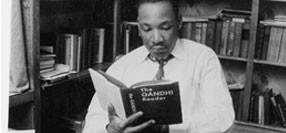
This summer, the Metta Center for Nonviolence is hosting a series on nonviolence education and building community that particularly focuses on how and why nonviolence can be particularly effective for reconciling conflict in schools.
Special guest Robin Wildman, a nonviolence educator from Broad Rock Middle School in Rhode Island with 25 years of teaching experience, leads this three-part series on June 9th, July 14th, and August 4th from 5 – 6pm PST (register here). Topics include breaking down conflict, understanding core nonviolence principles, and reconciling conflict.
Throughout, participants are encouraged to read Letter from a Birmingham Jail and King’s Pilgrimage to Nonviolence.
We also encourage participants to continue engaging with each other over the material by using the comments section of this blog post. To support engagement, we invite participants to review a summary of the call provided below and consider some relevant questions provided at the end of this post.
On the June 9th call, we discussed Breaking Down Conflict: Looking at types and levels of conflict and how that looks in schools and classrooms, as well as in our own lives. Listen to a recording of the call.
Highlights from the call include:
- The three levels of conflict:
- Normal: A healthy stage of conflict in which actors may disagree but engage through dialogue without causing emotional or physical harm. This level is essential for growth and should be actively encouraged.
- Pervasive: A less healthy stage of conflict in which actors may emotionally harm others. Actors tend not to listen to one another and a third party may be needed to deescalate the conflict.
- Overt: A less healthy stage of conflict in which actors may emotionally and physically harm others. Often requires a “calming” period before engaging in reconciliation.
- 4 Types of conflict (by source):
- Distributive conflict: conflict is borne from a scarcity of resources
- Pathway conflict: conflict is borne from a disagreement over ways to reach the same goal
- Mutually exclusive conflict: conflict is borne from a disagreement over ways and goals
- Values conflict: conflict borne from disagreement over (sometimes unstated) core assumptions, beliefs, or values about behaviors
It’s important to understand and be able to identify the level and type of conflict so that actors can be trained to respond effectively to each kind.
Practice: This week, see if you can apply the three levels of conflict and four types of conflict to conflicts in your own life, both past and present. Better yet, if you notice any normal conflicts, pay attention to what you can do to keep them normal and prevent them from shifting towards pervasive.
- Classroom recommendations:
- Start training students in nonviolence and conflict resolution from the first day of class
- Engage in personal reflection about what kinds of levels and types of conflict you are primarily engaging in. Consider what kinds of responses might lead to reconciliation
- Include a box in your classroom for students to ask private, anonymous questions (an “agape box”)
- Teach students how to address conflicts by role playing and practicing to recognize levels and types of conflict. Students should also think about how to engage with conflict
- Teach students the difference between joking (everyone thinks that it’s funny) and teasing (some don’t think that it’s funny; laughter at the expense of others) and explain why teasing is not acceptable
- Arrange desks in ways in which students are accessible and connected to one another and a teacher (e.g., a circle or u-shaped arrangement)
- Teach and consistently utilize a common vocabulary and set of concepts related to conflict and behavior
Questions for reflection:
- What are personal skills and practices that you have found essential for engaging with conflict?
- What techniques, practices or skills do you use to prevent conflicts from escalating?
- Given the myriad of curricular and extra-curricular demands placed on educators, how must educators be supported to more effectively social and emotional skills relevant to conflict reconciliation? What are other barriers to effective teaching of conflict reconciliation skills in schools?
- After listening to the call, what are your biggest takeaways, reflections, or additional questions?
Still hungry for more? Read Joseph’s full set of notes and additional questions for reflection.
We encourage any and all participants to engage with the material presented above in the comments section below. We hope to have a lively digital conversation in between our scheduled conversations so that we might address emergent issues as they arise.
Thanks for your participation! Please share your thoughts in the comments below.









Thank you Joseph for beautifully capturing our first call!
Great job, Joseph. It was wonderful to be able to review the last session before tonight’s call.